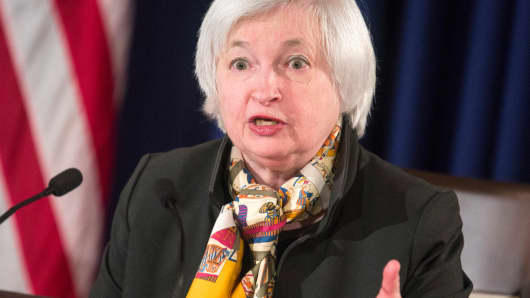The Fed is facing a series of new potential dilemmas when it comes to setting policy.
First, growth clearly slowed far beyond expectations in the first quarter and the jury is still out as to whether it has started to reaccelerate, just as it did last year after a soft first quarter.
Read MoreHere's what changed in the Fed statement
While inflation, as measured by the Fed's favored gauge, the Personal Consumption Expenditure Deflator (say that five times fast) is still below the Fed's 2-percent target, oil prices are rebounding off their lows with gasoline in tow; the dollar is sitting at a 2 ½-month low against major currencies; and bond yields are rising, here and abroad, with scant explanation as to why.
This represents a new conundrum for the Fed: Slowing growth, a whiff of inflation (though not much of one), easy money policies around the world that have ceased to drive down rates, and, most recently, complaints about a lack of liquidity in global bond markets.
The way to solve the last issue mentioned is for the Fed to sell bonds into the open market, but that would be highly counter-productive, and quite restrictive, as a policy prescription.
Two men who have held the title of "Bond King," Janus's, Bill Gross, and Doubleline's, Jeffrey Gundlach, are shorting German bunds, despite the massive bond-buying program underway in Europe.
Read MoreBill Gross: German bunds are the 'short of a lifetime'
It would appear they believe that with interest rates negative in Europe, there is no place to go from here but up.
And in recent days, they have been right.
Rates shot up enough in Germany to drive the German DAX index, its main stock market index, down 3.2 percent. That's the equivalent of a 580-point drop in the Dow.
European markets were down between 2 percent and 3 percent across the board amid the global growth scare, even as bond-market biggies are betting that rates will go up. That is cognitive market dissonance at its worst.
If this all sounds confusing … it is.
The Fed has more thinking to do before making a move on rates.
My guess is that a rate hike is not in the cards in June – and maybe even in 2015 altogether.
It is not at all clear that growth is reaccelerating in the U.S. It's not clear why inflation expectations, as measured by so-called "break-evens" in the Treasury bond market are rising, except that the recent rise in oil prices will push headline inflation back up.
If the Fed were to raise rates sooner, rather than later, growth slows further.
If they wait, as I have long expected them to do, the dollar may weaken more, driving oil prices even higher and, thus, complicating the inflation picture even more.
Read MoreHere are the odds of a Fed rate hike this year
The U.S. appeared on course to emerge from disappointingly slow growth this year, normalize monetary policy, at some juncture, and create even more jobs to assist the underemployed.
At this point, I am not sure any single outcome is assured. I haven't felt that way in quite some time.
Not only is everyone now data dependent in the worst possible way, but the data itself may be too confusing and too conflicting to make the Fed's job, or the near-term outlook any easier, or even any clearer.
Thanks for nothing.



